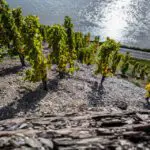What do you mean when you say ‘Rhine Wine’? Rhine Wine as in a taste? Rhine Wine as in the vineyards alongside The Rhine? Wine shipped on The Rhine?

Every once in a while, I check the analytics of my website’s traffic. Google tells me that people looked for ‘Rhine Wine Tours’. Oh ja! I have Rhine Wine Tours. Uh, at least some, in some regions, say Rheinhessen and Rheingau and Mittelrhein, with plenty of different wines. But is there such a thing as Rhine Wine? What have you been looking for when you searched for Rhine Wine?
In Germany, nobody says ‘Rhine Wine’ (or ‘Rhein Wein’ for that matter…). This is just too nonspecific for a river 1200 kilometers long (nearly 750 miles) and with some 160 kilometers (about 100 miles) of vineyards alongside its banks. There are 4 German wine regions along the Rhine: Besides Rheinhessen, Rheingau and Mittelrhein, one can count a bit of Baden, too. If thinking more generously, one could say that in some way almost all major winemaking in Germany is geographically connected to the Rhine through their respective rivers – the Mosel, Nahe, and Ahr all feed into the Rhine at some point.
There are huge differences in climate, soil, and terrain, and all of that creates an enormous diversity in what could be called ‘Rhine Wine’. For example, the most southern banks of the Rhine in the wine region of Baden belong to some of the warmest regions for winemaking in Germany. While much of the Mittelrhein wine region belong to the coolest areas.In Rheinhessen the vines along the river are rooted in red clay-slate soils; while a bit further north in Rheingau or Mittelrhein, the soil is almost only rock (typically slate). And if you look at terrain, some of the vineyards in Baden can be very flat; while some of the vineyards in the river gorges belong to the steepest in the world. And with the diversity of the nature comes also a diversity in grapes grown on the riverbanks. The vineyards in Baden are planted mostly with Pinot Noir, Gutedel, Pinot Blanc, Chardonnay, and Sauvignon Blanc. While Rheinhessen sports Silvaner and Riesling, even further, downstream Riesling and Pinot Nor are the most important varieties.
I believe I’ve made my point, right? Asking for ‘Rhine Wine’ in Germany is like asking for ‘California Wine’ in California.
But then, one question remains: What do people mean when they ask for a Rhine Wine?
Help me with some answers, will you?








